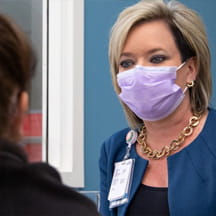Cicely “CC” Brooks was one of two ethnic minorities in her leadership development program in 2005 at Wolfson Children’s Hospital in Jacksonville, Fla.
Now the hospital’s vice president of patient care services and chief nurse executive, Brooks says Baptist Health, of which Wolfson Children’s is a part, has worked to increase minority representation among its leaders in the 18 years since.
Specifically, Baptist Health set a goal of having 25% of managerial roles filled by underrepresented ethnicities by 2024. The hospital has steadily progressed toward the goal, with ethnic minorities representing:
- 15% of positions at the vice president level and above.
- 30% of nurses and 30% of nursing management.
- 18% of physician positions.
To move the needle further, Brooks says the Baptist Black Organization for Leadership and Development (BaptistBOLD) employee resource group created a career development program aimed at employees in support areas like environmental services and food services.
“We wanted to expose them to the possibilities of leadership within the organization,” she says.
Identifying applicants
The BaptistBOLD Career Development Program launched in 2021 to position employees for career growth and develop a pipeline of leaders for the health system’s leadership development program. The group held meetings to introduce the program but relied heavily on managers to identify employees with the potential to become “stars in the organization.” In the program’s first year, 23 employees applied and 20 were accepted.
“We wanted to make sure we had a high level of commitment from the participants because this was going to be a big investment. We wanted to be able to prove that we were getting a return on our investment,” Brooks says.
Growing skills
Participants started with the basics. Hospital leaders taught classes on topics like:
- Resume writing.
- Interviewing.
- Business acumen.
- Soft skills like interpreting body language and having difficult conversations.
Brooks says participants also learned how to understand objectives, set SMART goals and network with peers.
“We wanted them to be able to walk into a room and have a conversation. We helped them come up with their 60-second elevator speech, whether about themselves, their career or goals,” Brooks says.
Building relationships
Participants were matched with a mentor within the Baptist organization, and the pair met for an hour a month. They also took part in a panel discussion with other Baptist Health minority leaders, specifically at the executive level and above.
“No question was off the table. They got to engage their executive leadership team in a very different, non-punitive, open way,” Brooks says.
Receiving recognition
The six-month program concluded with a ceremony where participants received a certificate and medal. Baptist Health’s CEO addressed the group and posed for pictures.
“It’s a big deal. We're a big organization, and not everyone gets the opportunity to have a frontline dialogue with their CEO,” Brooks says. “We also want them to know how it feels to receive recognition so when they become a leader, they understand how important that is to the folks they lead.”
Achieving results
Brooks said the pilot program’s results speak for themselves. After finishing the six-month program, 20% of participants were promoted or moved to an expanded role, and 11% were accepted into Baptist Health’s leadership development program.
“We didn't anticipate the value of some of the basics taught in the program. We did not know how impactful that was for the participants, and they absolutely loved it,” she says.
Moving forward
Advertising the BaptistBOLD Career Development Program became much easier in the second year. Word-of-mouth awareness generated 50% more applicants in the second year.
“All of the folks who worked alongside these participants saw their growth and development and talked about this amazing opportunity. We wanted to make it engaging, we wanted to make it fun, and obviously, we were able to accomplish that,” she says.
Brooks' presentation, “Creating Inclusive Leadership Program,” was an educational session at Children's Hospital Association’s 2023 Annual Leadership Conference.



